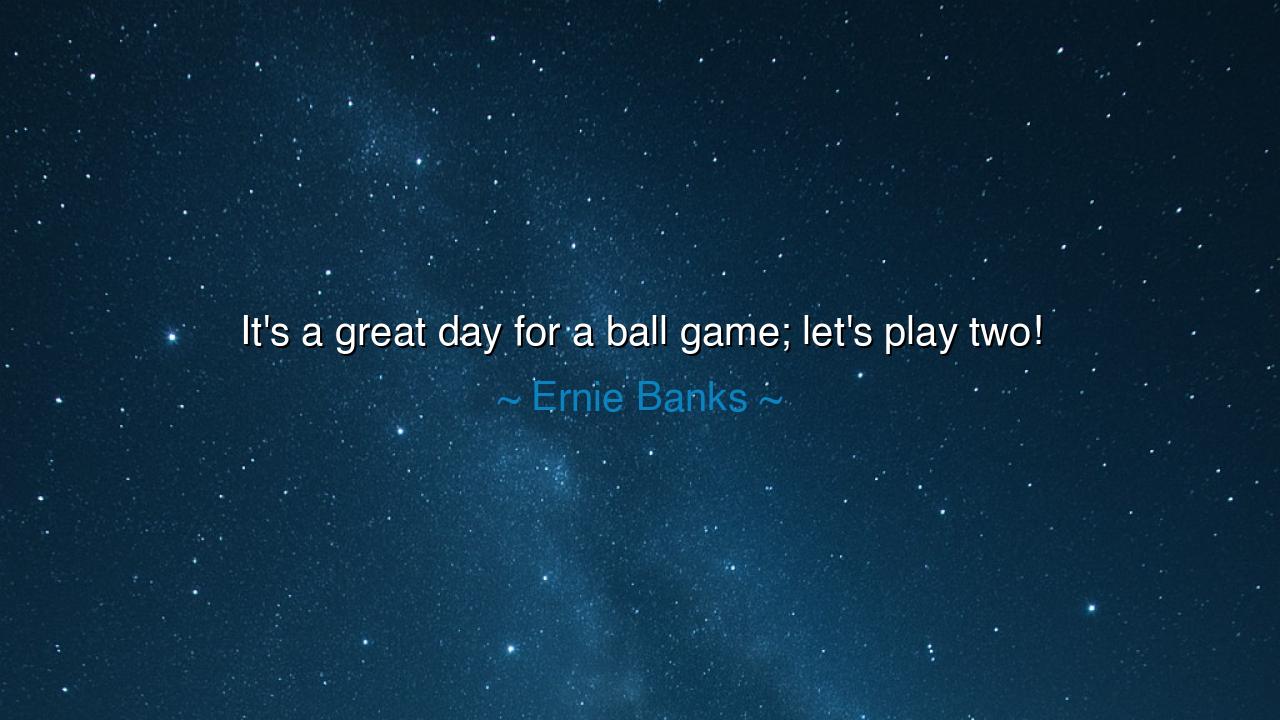
It's a great day for a ball game; let's play two!






In the ancient manner of wisdom’s keepers, let us speak of a phrase simple in sound yet vast in soul: “It’s a great day for a ball game; let’s play two!” So spoke Ernie Banks, the beloved “Mr. Cub,” whose spirit burned bright not only on the field of play but within the hearts of all who beheld him. These words, uttered beneath the golden light of an ordinary afternoon, carry the warmth of gratitude, the fire of joy, and the undying faith that each day—no matter how plain—may hold two games’ worth of glory for the willing heart.
In the cadence of the ancients, we might say: he who speaks thus has learned the art of embracing life’s abundance. For the man who says, “Let us play two,” is not driven by victory alone, but by love—love of the game, of labor, of the fleeting moment where spirit meets challenge. Ernie Banks, playing through sweat and sorrow, through summers of triumph and years of drought, did not wait for perfection to rejoice. He rejoiced simply because there was a game to play. Such is the wisdom of those who dwell in the light of their calling.
Once, when the Cubs had long endured seasons of loss, the people still came to the park to see Ernie Banks. His team might be behind; the winds of Wrigley might be cruel; the standings might mock his hope—but his smile remained. “Let’s play two,” he would say, not as boast but as benediction. It was a prayer of gratitude: that there is still sunlight, still grass underfoot, still the chance to begin again. In this way, his words transcend the sport. For is not life itself a doubleheader? The first game we play with our strength, and the second with our soul.
So let it be remembered, as once the warriors of old carved their teachings into stone: Joy is a choice, not a reward. Ernie Banks knew that happiness was not given to the victor alone—it was seized by the one who showed up, eager to live the moment twice over. This spirit is rare and golden, for most hearts grow weary after one battle, one task, one day’s toil. But the wise and joyful soul says, “Let us play again.” For repetition is not burden when love is the fuel of effort.
In the scrolls of history, we find others of kindred flame. Consider the farmer who rises before dawn, not once but every morning, sowing seed after seed though storms have taken his last harvest. Or the artist who paints one more canvas though her last sold to none. Or the teacher who, at day’s end, stays behind to help one more struggling child. Each of them whispers, in the language of their labor, “Let’s play two.”
The lesson, dear listener, is this: Life gives us one field—but infinite innings. We may choose to withdraw after the first, weary or defeated, or we may lift our hearts for another round. When fatigue whispers that we have done enough, let us remember Ernie Banks, smiling beneath the sun, and say instead, “There is joy yet to be had. Let us play again.”
Therefore, in your days—whether you labor in study, in love, in craft, or in service—do not seek only the reward of completion. Seek the radiance of participation. When a task ends, and you feel the ache of effort, let your next thought not be escape but engagement. Say to your own soul, “Let’s play two.” Rise once more to your calling, and you shall find what Ernie found—that in the act of devotion itself lies the victory eternal.
For the true measure of a great day is not the scoreboard, but the heart that dares to play twice.






AAdministratorAdministrator
Welcome, honored guests. Please leave a comment, we will respond soon